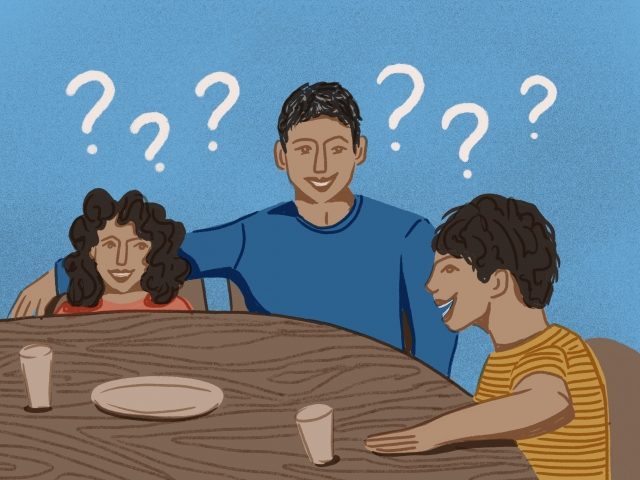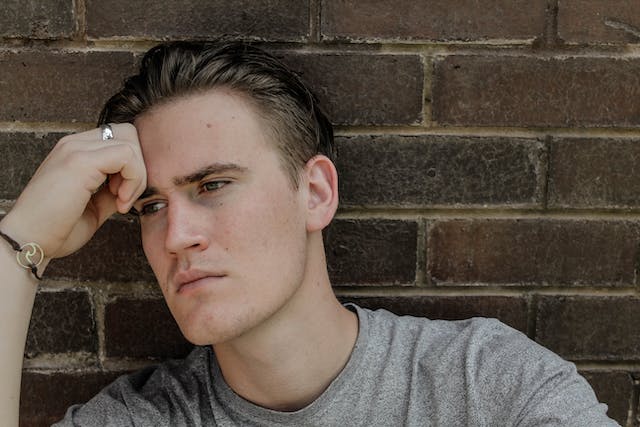Happiness
Episode 64: Helping Kids Think About the Good

Child No, you hold it.
Parent I am holding it.
Parent Ready?
Child I’m ready!
Parent So what are you most grateful for right now?
Child My house, and my parents that keep the rent for the house.
Child I am most grateful for the roof over my head, my mom and dad.
Child Just like, having a place to be able to stay in when we’re told to stay still.
Child My toys and my house..
Parent What are you most grateful for?
Child I am grateful for the internet and I am grateful for food.
Child For my phone, because it lets me talk to my friends.
Child Having my own space in my house where I can go to get away from it all.
Child that we have pets so we don’t go totally insane just by ourselves.
Child I’m grateful that I get to be with my parents and I’m not sick and nobody in my family is sick.
Parent Anything else you want to add?
Child I’m just happy that my family is ok.
DACHER KELTNER A lot of us who are sheltering at home right now are doing so with our children. Maybe we’re homeschooling, trying to get our own work done, striving to maintain structure, it’s not easy. We’re helping our kids navigate their emotions while processing our own.
So this week on the Science of Happiness we’re exploring a practice we can do with the children in our lives, to help deal with stress and provide an anchor in the midst of the huge life changes they’re experiencing during the COVID-19 pandemic.
Our guest today is Abdi Nazemian, an award-winning novelist and screenwriter and father to eight-year-old twins Evie and Rumi.
When we asked Abdi to try a practice that he could do while sheltering at home with his kids, he chose one to help them focus on the good things in their lives.
And he’s joining us from his home in Los Angeles. Abdi, it’s great to have you on the show.
ABDI NAZEMIAN Thank you so much for having me.
DACHER KELTNER: So we asked you to choose a practice that you could do with your children, and you chose, “Gratitude Questions for Kids.”
You asked your twin eight year olds a series of questions to really explore what they are thankful for, right now. Why’d you choose this exercise?
ABDI NAZEMIAN 11:59 I chose this before we were, you know, sheltering in place. And it’s something we talk to our kids a lot about. Because I think especially with children, you know, children really only know the world as they see it. It’s very hard to give children a visceral experience that they can’t see or feel. And I think as we get older, so much of what we do is we, we start to see, you know, outside of our own bubbles and we start to realize that our experience is not the universal experience.
And so I think that, when I chose this exercise, we had already started to think about, well, how do we make these kids understand how lucky they are in so many ways and to make sure that they, you know, spend some time being grateful, because kids are like I almost feel like they’re wired to just want like more or more, more, it’s almost like their instinct. The minute you give them something that is wonderful, it’s like, then they want more of it. Or when it’s taken away, they freak out. You know, sometimes sometimes their biggest, you know, moments of challenge or meltdowns, whatever you wanna call it, come after it. Like, I remember one day we had the best day, like we went out all day and had play dates and, you know, went to the farmer’s market and got them all the food they wanted. It was like, and, then at the end, was Meltdown City. And I’m like, this is what happened. It’s almost like when you’re getting so much of something that is wonderful, then it’s taken away. And when you’re a child, you don’t know that transitions are very, very hard. And so I think, you know, gratitude practice for me or a reminder is such a great way for children to just reset in a way.
DACHER KELTNER Absolutely. So to break down the steps of this practice, you’re instructed to take five minutes or so to ask your kids a series of questions using a ‘notice—think—feel—do’ model that was developed by researcher Andrea Hussong (HUH-song) at the University of North Carolina at Chapel Hill.
First, you ask them to notice something they’ve been given or have in their lives that they’re grateful for.
You then have them think about why they’ve been given that gift , and reflect on how it makes them feel.
And then finally, you ask your kids if there’s anything they want to do to show how they feel about it.
I love this practice in particular because it can also be a useful tool for teachers, extended family, and anyone else in kids’ support networks.
So—how did the ‘Gratitude Question for Kids’ practice go for your twins?
ABDI NAZIEMAN We did it,, me and my husband and Evie and then me and my husband and Rumi, separately. Using Evie as an example, the first step was to ask her something that she’s grateful for and to have her pinpoint that.
I think what’s great about it is you start with just a very simple question around pinpointing something you’re grateful for. And then it’s really asking these follow up questions around the source of that gift. And I think this exercise can go so many different ways, because when we started it, we did it individually with, with each of our children. And when we started it, I was fully expecting to hear, you know, I have a mother who loves to send them gifts. I mean, we’re always getting, you know, boxes of clothes from her because that’s just what she does. And so I’m fully expecting them to be like, “I’m grateful for, you know, her gifts”. With Evie our daughter who was much more in this case. I don’t know if it was the day we caught her on, but she was a lot more engaged, I would say, that day in the exercise she was she had a lot to say, but really the first thing she said, which I thought was so amazing when we asked her to pinpoint something she was grateful for is she started by talking about the Coronavirus. And she said, “You know, the Coronavirus is spreading. But at least we still have love and hope.” And then she went on to talk about family and, you know, being grateful for family, which I thought was so…it was so interesting that I felt like she connected it to the virus. It wasn’t like she just didn’t just say, “I’m grateful for family.” She really started by saying, you know, “There’s this virus out there, and that’s made me more grateful than ever for love and hope and family.” And I thought that that was so beautiful because it made me think, well, maybe a few weeks ago, it would have been a different answer.
DACHER KELTNER Absolutely. You know a lot of my UC Berkeley students that I’m having virtual meetings with right now, first they talk about loss and grief disrupted lives, but then they talk about the importance of family, and just feeling close.
The next step is then to ask more about the gift, how it makes them feel, why they think they received it, what they can do to show their appreciation. The idea is that children won’t just be listing what they’re thankful for, but they’ll also reflect and act on it—and that’s practicing gratitude.
I’m curious, what did your daughter Evie say when you asked her to elaborate on why she’s grateful for family and hope?
ABDI NAZIEMAN She had this really, really beautiful description of what a family is to her. And she was talking about an art project she made with pom-poms where you make the pompoms and you stick them together. And that, that’s what a family is. It’s like the family has to stick together. And I thought that was so.. kind of visual and beautiful. And she really separated from love. It was interesting because she said, you know, she said “Love isn’t the thing that brings you together. Love is something that happens. You know, you fall in love with people. But what family is, it’s like these pom-poms. It’s like you have to stick together.” And I was like, that’s really perceptive because I think, of course, as you get older, you start to make those realizations about, like, you don’t necessarily choose your family. Right. It’s not like you fall in love with your family the way you do with someone you choose to love. But at the same time, that, that connection, that loyalty. So I thought that was really incredible that she described it in that way. And I feel like I’m going to start thinking about family like that. We are all pompons who are stuck together by a child’s art project!
DACHER KELTNER Was there anything else that struck you during that gratitude conversation with Evie?
ABDI NAZIEMAN She did say one thing that really stuck with me and I wrote it down, which was which was, “I think there’s nothing more to my life. There’s nothing more to it. And I love my life. This is a great life,” is what she said. And I thought that that was so interesting when asked kind of how it makes her feel. Because I think the thing is, is like you think so much about how we define ourselves. And so many times the things that we use to define ourselves are these external things. And that she was saying that the thing that defines her life is this love and family and hope. And that that’s what it is and that’s a great life. And that if she has that, then the rest is like, right, the rest is just window dressing. I mean, she didn’t say this, but that’s me, like filling it in. And I think that’s such an incredible thing to know that she feels deep down, because so much of the time, the things that we’re focusing on with 8 year olds are not that, you know. And then finally, it was, it was, around how she can give back or or whether she wants to. And with that, I mean, in my notes, she talked about how much she loves giving and loves to see the smile on people’s faces when they’re happy. And again, I think that, that the beauty in that is just this observation that she is aware that by giving that same thing that she loves getting, which is love and connection, right? She can see that it makes other people smile and makes them happy. So I really think there’s like an interesting connection from the beginning of the exercise where she’s pinpointing the thing that she loves, how it makes her feel really good and makes her feel that she loves her life, you know, which is such a great thing to feel. And then knowing that she can give that same gift to others…is pretty powerful.
DACHER KELTNER We know grateful kids and teenagers tend to be more engaged in schoolwork and hobbies, they’re more satisfied with family, community, friends, and themselves, And now research on gratitude is starting to explore what it’s like to watch somebody else’s gratitude unfold. What was it like for you and your husband to hear these riffs on gratitude from Evie and Rumi?
ABDI NAZIEMAN Oh, I mean, it’s incredible. It’s so it’s so powerful. I mean, when you’re a parent. You’re always having these incredibly emotional reactions when your kids say something like that because, you know. It’s just very emotional to hear a child that you remember as a, you know, non-verbal baby suddenly stringing together these incredible thoughts. So much of parenting is just presenting certain tools to your kids and seeing what resonates with them, but just giving them a tool for when they feel overwhelmed. It’s like, okay, just boil it down to what you’re grateful for. And then I think what’s so beautiful is, is usually what comes out is something that is so true and basic. It’s like you know, the kids spend most of their time talking about ice cream and candy and video games. But then you ask them what they’re grateful for. And it’s like “Love and family.” And, you know, it’s so interesting because it’s not like they’re spending the whole day talking about love and family. But when you really focus them and you ask them in a more serious way, that’s what comes out. I would say it’s the same thing with grown ups. Like I can spend most of the day thinking about, like, you know, my next career goal or how I wish my book would be turned into a movie or whatever or whatever. But then when you asked me to break down what I’m grateful for in a journal. That’s not what it’s going to be.
I mean, there’s a lot to be frustrated about right now. But when you’re around an 8 year old who’s saying “We’ll be okay if we have love and hope,” you’re suddenly like, “well, maybe it’s not such a big deal I can’t go to a restaurant.”
DACHER KELTNER A little bit of hope, absolutely.
ABDI NAZIEMAN Exactly.
DACHER KELTNER Abdi, is there anything you would add to this practice, having done it once with your twins?
ABDI NAZIEMAN I will say one thing that is very important. And and I think maybe like with our, with our son, we could have done this a little more, is transitioning them into the exercise. Transitions are so important for kids. If kids are in the middle of reading a book and it’s time for snack and they haven’t finished the book and you’re like, “Come on, it’s snack time,” they’re going to be frustrated. And so it’s like, guiding them through a transition to a new thing. Asking an 8 year old to answer, you know, six questions about gratitude is a lot for them. That’s not what they’re used to. And so I do feel like, sitting them down and saying, OK, like now, you know, prepping them for what’s to come and giving them a little time to transition, maybe giving them a little time to think before going into it. I mean, the same way that right before bedtime, you don’t want them to be like, you know, running around and having sugar because you want to transition them into bedtime and you want to kind of try and get them into a peaceful state. I think if you’re trying to get them to do a gratitude exercise or a meditation, giving them a chance to go from whatever they were doing before to it is probably something I would do if we did it again.
ABDI NAZIEMAN And then I think at the end, I would really suggest maybe a, just a moment of reflection, because, again, it’s so much. 8 year olds are not used to being asked these questions in this way, and being put on the spot kind of, you know, on an emotional level like this. And so I think maybe to give it like a little bit of a closing reflection where they get to kind of think about what they said, maybe let it, let it settle in…might be good. I mean, maybe even some kind of meditation where they get to think about it could be really interesting.
DACHER KELTNER Yeah. Absolutely.
How, in all the ways that you practice gratitude in your family, do you think it helps build a sense of connection in your home?
ABDI NAZIEMAN I think for starters, usually when we practice gratitude, the thing that we end up being most grateful for is each other. So it’s a good reminder. You know, it’s a very good reminder, especially at a time like now where we’re all, you know, stuck together. You know, I’m sure for a lot of people sheltering in places like a version of No Exit, which if anyone hasn’t seen it, is that Jean-Paul Sartre…Yeah, the Jean-Paul Sartre play, which I directed in high school, you know, where three people are stuck and hell together. And the most famous line of the play is hell is just other people. Right?
NO EXIT So this is hell…There’s no red hot pokers. Hell is other people.
ABDI NAZIEMAN But I think that then the flip side, you know, is so true as well, which is heaven is just other people, too, right? And so I think that, you know, the interconnectivity of gratitude in a family like ours is that it’s just a reminder that even though, you know, you’re bound to have little annoyances with people when you’re always in the same space as them. That the love is so strong and so, so beautiful that it brings you back to each other and that in that way. And I think that that’s incredible. I would also say it opens up a way for kids to communicate to you that is much deeper than the way they’re used to communicating to you. You know, because when you give them the opportunity to self-express in a deeper way, they will then do it more often and they will realize that they have that power within them.
DACHER KELTNER Well, Abdi, I wanted to thank you for taking time away from your writing and your producing and all the things you have going on and for giving us some nice pieces of wisdom about what to do while sheltering in place and homeschooling kids, which I know can’t be easy.
ABDI NAZEMIAN Thank you so much.
DACHER KELTNER We know that empathy, taking other people’s perspectives—those are the building blocks that children need to help them fully experience gratitude.
ANDREA HUSSONG But what parents were supposed to do to cultivate that was still pretty unknown.
DACHER KELTNER More on how to help our kids absorb the good in their lives, up next.
DACHER KELTNER One reason it’s so important to start cultivating gratitude early on with children is we know it brings important benefits later in life—better heart health, lower stress, stronger relationships. Overall, giving thanks makes us happier.
ANDREA HUSSONG So we think about gratitude moments as having these four parts. So, the first three really focus on the experience of gratitude. And you get that through what parents and children notice to be grateful for, and then how children make sense of those things that they have in their lives through their thoughts and their feelings. And that sets them up for the last part of gratitude, which is what we do to show appreciation.
DACHER KELTNER Andrea Hussong is a developmental psychology professor at the University of North Carolina at Chapel Hill. She says these “notice - think - feel - do skills” help children receive experiences of gratitude more deeply.
DACHER KELTNER Andrea and her team interviewed 100 parents and their kids about gratitude, and then they followed these families over time.
ANDREA HUSSONG We’ve gone in to ask children: What is gratitude like for them? And ask parents how much they’re seeing gratitude in their children through how much the kids are noticing, thinking, feeling and doing things that have to do with gratitude moments. And then we’re asking parents about all these things that they’re doing. Like, “Do you model gratitude for your kids? Do you help them find places to hang out or friends to hang out with or activities to be involved with where gratitude might be valued and practiced?”
DACHER KELTNER They also asked about conversations parents may have with their children about times they were grateful, and help them recognize any privilege they might have in their lives.
ANDREA HUSSONG What we found over time is that parents modeling seems to be related to having more moments of gratitude for children. The extent to which parents are helping pick these niches or places in society that value and practice gratitude: that’s related to children’s gratitude.
DACHER KELTNER They also found that conversations really matter. And not just talking about times when kids are grateful and talking that through with them, but how do we handle those times when they fail to be thankful?
ANDREA HUSSONG That big goal of helping our children become more socially and emotionally skilled over time is something you build one pebble at a time. And each time you can help your child notice those things that they’re receiving in their lives…that’s one of the skills we hope that they have. When we can help them take somebody else’s perspective and say, “You know, I wasn’t really into those socks that grandma gave me. But if I think about the gift behind the gift, if I really think about it, it’s really about how grandma really…she really cares about me.” And so it prompts those social connections and really provides that support that we might see. We can experience that support by learning how to deeply receive those gifts, and then we can make those relationships stronger by showing our appreciation.
DACHER KELTNER One of the places parents can get very hung up is when we’re thinking about gratitude in our children from our own perspectives instead of from their perspectives.
ANDREA HUSSONG So if we can slow down enough and ask enough questions that are open ended to hear where your child is coming from, you might find out that that behavior that you thought was really about being ungrateful was really about: being really excited about what’s coming next. Or something that wasn’t in your mind. So I think the one thing I would push is that you get to take that deep breath, put the distractions aside, and try to see if you can get into the world from your child’s perspective.
DACHER KELTNER If there is a moment that captures a kid’s interest, just ask them, “What’s so wonderful about this? Why did this thing happen to you?” And that moment will be different for each family: a walk in nature, a homemade fort, a favorite game. It’s about trying to find that tiny bit of openness just to reflect on, “Why did this great thing happen to you? Who helped to make it possible?” And of course, that’s something we can do for ourselves too. If we can open ourselves up to whatever those little moments are that are just happening all the time, we don’t necessarily have to make extra time for gratitude.
I’m Dacher Keltner, thanks for joining us on The Science of Happiness.
We at the Science of Happiness and the Greater Good Science Center are producing all kinds of resources to foster health, resilience, and connection during these challenging times.
And it’s made possible by donations from listeners like you.
If you’d like to support our work and the millions of people who rely on it, please visit greatergood.berkeley.edu/donate and give what you can. Every donation helps. Thank you.
If you’d like to try this Gratitude Questions for Kids practice, check out our Greater Good in Action website at ggia.berkeley.edu.
Share your thoughts using hashtag #HappinessPod or emailing us at greater@berkeley.edu.
Our podcast is a co-production of UC Berkeley’s Greater Good Science Center and PRX. Our senior producer is Shuka Kalantari. Production assistance is from Jennie Cataldo and Ben Manilla of BMP Audio. Our associate producers are Brett Simpson and Ariella Markowitz. Our executive producer is Jane Park. Our editor-in-chief is Jason Marsh. Our science director is Emiliana Simon-Thomas. Special thanks to UC Berkeley’s Graduate School of Journalism.
The Science of Happiness is brought to you by the John Templeton Foundation. The Templeton Foundation harnesses the power of the sciences to explore the deepest and most perplexing questions facing humankind.
Learn how their grantees are helping to address the coronavirus crisis at templeton.org.





